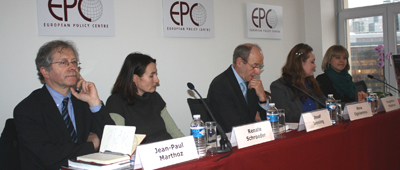The European Policy Centre (EPC), Brussels’ leading think tank, hosted CPJ for a policy dialogue marking the launch of our annual survey, Attacks on the Press, on Tuesday. CPJ’s visit to Brussels coincided with a heated debate over Hungary’s new controversial media law, which has eclipsed the country’s first months as EU’s rotating president. The law became a focus of our Tuesday discussion.
The panel–titled “Is press freedom in Europe under threat?”–featured myself, CPJ Senior European Adviser Jean-Paul Marthoz, Kazakh journalist Yevgeniya Plakhina, and the European Federation of Journalists’ co-director, Renate Shroeder. Josef Janning, EPC’s director of studies, moderated. Panelists spoke before a room full of journalists, EU representatives, media and human rights advocates, and academics.
While Hungary has said it will comply with requirements laid by the European Commission–the institution tasked with monitoring the implementation of the union’s directives–journalists worry that the EU has been soft on Budapest, insisting only on nominal rather than fundamental amendments of the legislation. CPJ fleshed out those concerns on Tuesday and called on the commission to seek meaningful changes, which will not only address technical issues but will align the law with EU’s Charter of Fundamental Rights, a binding guarantee of freedom of expression.
“The European Union is more than a conglomerate of individual states that abide by technical rules,” CPJ’s Marthoz told the EPC audience. “It is a community of values.” When those values are not respected by EU’s own president, he noted, the EU provides authoritarian governments in neighboring Eastern European and Central Asian states the perfect alibi to crackdown on their own press.
I noted the damaging effect EU’s failure to press its own members on media freedom offenses has on beleaguered journalists in the former Soviet bloc, who are at constant risk of physical attacks, bureaucratic harassment, politicized legal prosecution, even murder, as retaliation for their work. Those journalists are made even more vulnerable when the countries they look up to for support and inspiration take a turn for the repressive. On Tuesday, CPJ’s message to EU leaders was terse: Get your house in order.
No one was a better ambassador for that message than panelist Yevgeniya Plakhina, a correspondent for the embattled Almaty-based weekly Respublika. The newspaper has been a pariah in Kazakhstan for a decade. It is denied printing services and slammed with exorbitant fines intended to shutter it; its website is permanently blocked domestically. Plakhina and her colleagues now rely entirely on social networks such as Facebook and Twitter to bring Respublika to its readers.
Plakhina told the EPC audience she had hoped Kazakhstan’s chairmanship last year of the Organization for Security and Co-operation in Europe (OSCE) would bring press freedom gains. Those gains never came. “On the contrary, things got worse,” Plakhina said. The government passed new restrictions, stifling criticism of officials and stunting the development of an emerging blogosphere in Kazakhstan. The OSCE was largely silent as its chairman kept chipping away at its citizens’ rights and freedoms.
“Did you contact EU institutions about your problems?”–a journalist asked Plakhina. Yes, she said matter-of-factly, but there was no reaction. Instead, the other 55 OSCE member states (which include many EU members as well as the United States) agreed to hold a summit in Kazakhstan’s capital, Astana, in December. Despite repeated calls by CPJ and others, Kazakhstan’s press freedom record never made it to the summit’s agenda. Business was business as usual. Attacks on the press in Kazakhstan persist unabated.
When addressing Hungary’s press freedom record, the EU must learn from OSCE’s recent mistakes on Kazakhstan.
(Reporting from Brussels)
